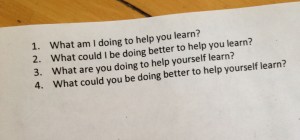Hi everyone,
Kris here, as usual. Classes started back up at UNM this week so I figured I should dig back into WITA, too. We did a lot of good work last year, I think, mostly thanks to Ambar, but we also had a lot of false starts and unfinished projects. Since my plans to leave town for a PhD program changed in the middle of the summer, WITA’s not going anywhere, but it’s also probably going to look very different.
Instead of trying to do several flashy events throughout the year whose attendance numbers depend on juggling everybody’s schedules, it will probably be best for us to stick with just a few long-term-but-low-maintenance projects. We’ll try to get the mentoring list back off the ground, and try some new ways to regularly get original writing here on the blog. Also look forward to short yoga-for-grad-students videos.
We might still do a roundtable each semester, or at least in the spring for the big GRC conference, but no more of me promising that a million things are going to happen that I end up not following through on. I used to say a lot that I wish WITA was my day job, and I do still wish that, but it wasn’t, and isn’t, so last year I kept writing checks I couldn’t cash and putting WITA on the back burner so I could attend to this student government issue or that (or my thesis), and for what it’s worth I apologize.
So with that said, if you’d like to help out this year, here’s what you can do:
1) Ask a professor if she’d be interested in signing up for Mentor a Student (or sign up yourself, if you like). What we have in mind isn’t as formal as that might sound; it’s just a list of faculty who’d be okay with getting cold-emailed by students who want to talk to someone about what it’s like to be a woman in higher ed, maybe over coffee. If more formal mentoring relationships grow out of that, great, but we’re not asking for a commitment up front. If you signed up last year, you don’t have to fill out the form again.
2) Consider being a guest blogger on any topic at all relevant to our mission. One angle to pursue would be along the lines of Tenure, She Wrote. Another would be to just write about your research or area(s) of academic expertise/interest. Think of the Phenomena blogs for National Geographic, or the writing advice and pop culture criticism at io9 (the Gawker network’s science/futurism/speculative fiction blog), or the wide-ranging commentary Ann Friedman writes for The Cut, or even stuff like what Maria Popova does at Brain Pickings (although you probably won’t want to write at the same length she tends to). Alternatively, there’s always Tell Your Story.
So that’s what I have in mind to keep us going. The point of WITA was always to have women share their knowledge and wisdom, whether or not they were interested in more activist-y endeavors, and these seem like relatively simple ways to do that. And I’ll keep posting links that I hope are interesting.
Oh, important: contributors don’t have to be affiliated with UNM (mentors do, alas). So if you’ve got brilliant blogger friends, maybe ask if they’d like to do guest posts here. I may write more later about developing this guest writing project, but for now I’ll cut myself off. Happy first week of school (again)!
Kris
